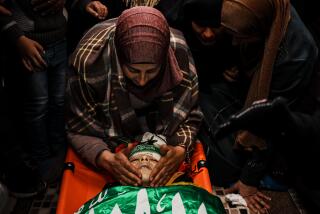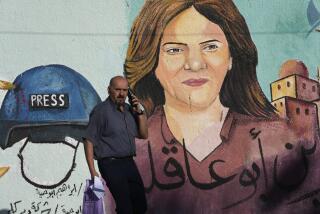‘Professor’ Was Channel for News of Rebels : Slaying Spotlights Afghan Rifts
- Share via
NEW DELHI — His name was Syed Bahauddin Majrooh, but everyone called him “the professor.”
He had a doctorate from a university in France and was once dean of the literature faculty at Kabul University in his native Afghanistan.
Under former Afghan King Mohammed Zahir Shah, he had been a provincial governor and a diplomat.
But for the past eight years, until he was shot to death Thursday, Majrooh had lived as a refugee in Pakistan, in the North-West Frontier city of Peshawar, where he edited a monthly newsletter on the progress of the Afghan rebel war against Soviet and Soviet-backed troops in his homeland.
Respected for Candor
Majrooh was widely respected for his candor and intellectual honesty, in a place where these are uncommon virtues. Peshawar’s main market is The Story Tellers’ Bazaar.
His office, in a small house in University Town, a suburb of Peshawar, was an essential stop for visiting diplomats, scholars and journalists, as well as nearly every Afghan rebel commander back from the fighting.
Majrooh, 55, a tall man with thinning white hair and a pronounced limp that forced him to use a cane, had lately been critical of fundamentalist Muslim elements in the resistence.
“The Russians must be happy about what this group is doing,” Majrooh told a reporter for The Times in January, after a series of attacks on Western journalists and aid workers by a fundamentalist group known as Hizb-i-Islami (Party of Islam). “They are doing exactly what the Russians want them to do, preventing Westerners from going inside Afghanistan. The Russians would like to make it difficult for Western journalists, but they cannot do it themselves. The Hizb-i-Islami is doing it for them.”
Enraged Fundamentalists
Last July he enraged leaders of the fundamentalist groups by publishing a survey of 2,000 Afghan refugees in Pakistan. He said it showed that 71% them would support the return of King Zahir Shah.
The king, who lives in Rome, is despised by the fundamentalists, particularly Hizb-i-Islami’s leader, Gulbuddin Hekmatyar.
Thursday evening, according to a report from Peshawar by the British news agency Reuters, someone went to Majrooh’s office and shot him six times with a Kalashnikov rifle. Majrooh’s body was found sprawled over the threshold of the front door. His son, Massood, told Reuters he had no idea who killed his father.
Diplomatic sources here and in Pakistan speculated that his death was linked to a power struggle within the Afghan resistance, a loose collection of fighting groups known collectively as the moujahedeen (holy warriors) that includes royalists, fundamentalists and other Muslim sects.
As rumors of a settlement of the 8-year-old conflict intensify, fighting among the various groups has increased as they vie for advantage in postwar Afghanistan. The fundamentalists would like to see Afghanistan emerge as a strictly Muslim state; the moderates hope for a secular government.
Majrooh was certainly no fundamentalist. He was a Muslim, yet he loved whiskey and champagne. He was educated in France and he adored everything French, but he spoke English and German as well as French and his native Pushtu and Persian, in which he wrote a volume of poetry.
Every July 14, which the French celebrate as Bastille Day, he shed his traditional Afghan garb and donned a double-breasted navy-blue blazer and traveled to Islamabad, the Pakistan capital, to attend the festivities and drink champagne at the French Embassy. He was also a regular at the Bamboo Bar, which French aid workers had set up at their residence, the Maison Blanche.
Majrooh was a rarity in rough and tumble Peshawar, an intellectual in a den of ignorance, an aesthete in a place of great and persistent violence. This latter quality was revealed one night at the home of an American diplomat.
Majrooh had consumed several large whiskeys, and a Western reporter, fresh from a clandestine journey into Afghanistan, was talking earnestly about having seen fields of opium poppies that were being nurtured by the Afghan rebels, possibly to sell opium to raise money for their cause.
Suddenly an ecstatic look glazed Majrooh’s features. He sprang from his chair and limped into an adjacent room, where he collapsed on the floor singing, in French, “Fields of flowers, beautiful flowers, beautiful, beautiful flowers.”
Despite his love of the West, Majrooh was thoroughly Afghan, and he possessed a near-encyclopedic knowledge of his country and its terrain. This made him an ideal interviewer of battlefield commanders coming to Peshawar to rest and resupply.
The newsletter for the Afghan Information Center that he directed in Peshawar was regarded as by far the most authoritative publication on the war.
A Blow to News Gathering
His death, therefore, is a serious blow to the sparse information network used by Western diplomats and journalists who monitor the war.
“Anybody who has ever had anything to do with Afghanistan knew him,” a Peshawar journalist said.
Majrooh was responsible for breaking several stories on the Afghan conflict, including some that were adverse to the rebel cause, like the 1986 loss of the rebel base in Jawar. Even when spokesmen for the U.S. State Department insisted that the base had not been lost, Majrooh, depending on his excellent sources among the fighters, insisted that it had. In the end he was right, and the loss was considered one of the guerrillas’ worst of the war.
“The professor” had a keen eye for a story, and loved nothing more than to spring an unusual yarn on reporters. One of his more famous media coups came when he introduced a fat rebel commander, a rustic bumpkin from a border province, to a small group he had invited for tea. The commander, totally unaware of his newsworthiness, told the reporters he was in Peshawar to buy spare parts for his squadron of Japanese motorcycles.
As the reporters reached for their notebooks, Majrooh listened and giggled. The rebel leader then explained that his guerrillas were preparing for a motorbike attack on a Soviet unit--Afghan tribesmen on Suzukis descending on the sleeping soldiers.
The story was on the front page of many newspapers the next day.
More to Read
Sign up for Essential California
The most important California stories and recommendations in your inbox every morning.
You may occasionally receive promotional content from the Los Angeles Times.













